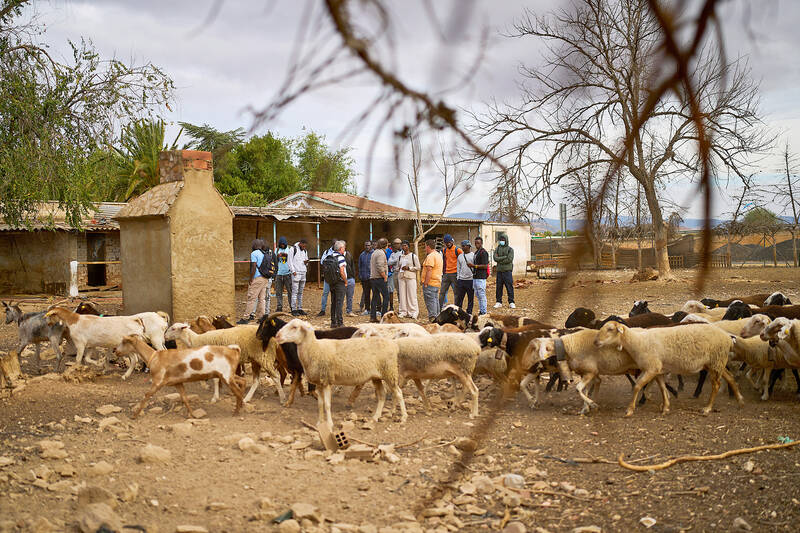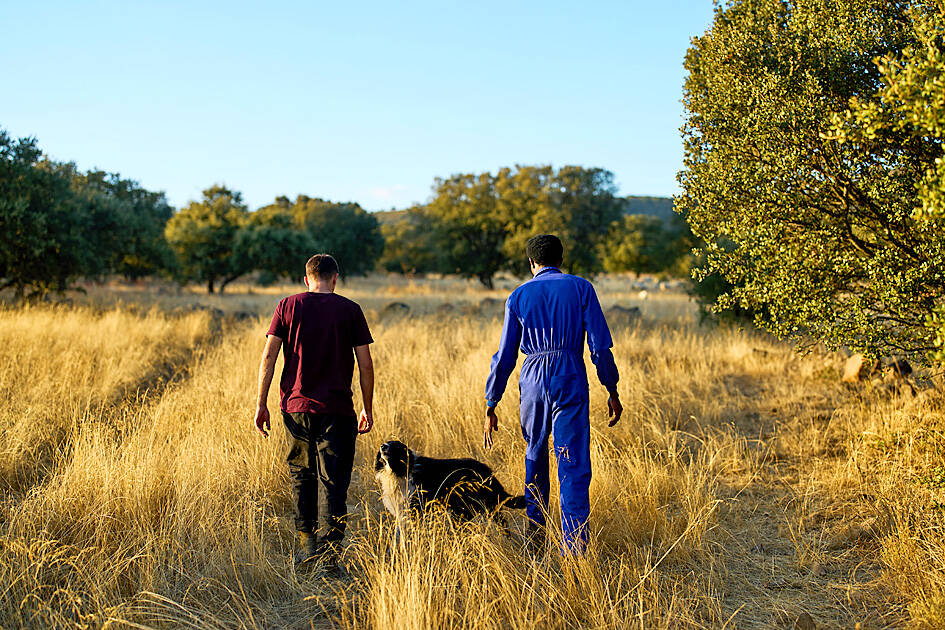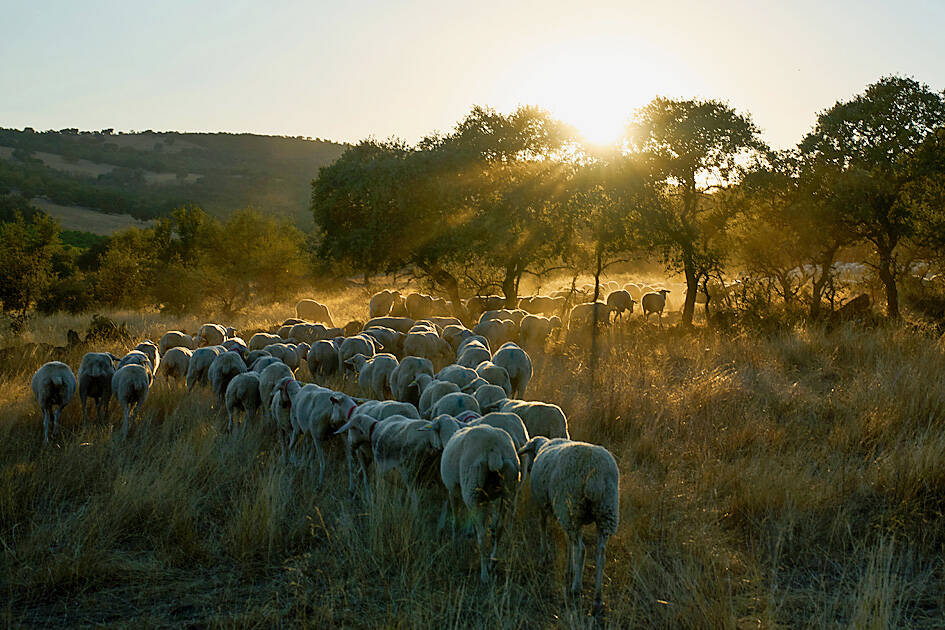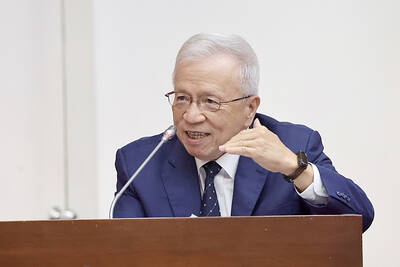The bells and bleats faded as Osam Abdulmumen, a migrant from Sudan, herded sheep back from pasture, the sun setting over a centuries-old farm in Spain’s arid heartland.
From dawn to dusk, Abdulmumen, 25, has looked over a flock of 400 animals for months in Los Cortijos, a village of 850 people in the plains of Castile-La Mancha, the region in central Spain made famous by the 17th-century classic Don Quixote.
Los Cortijos is among hundreds of rural villages and towns in the region coping with depopulation that has made it tough to fill a job that has existed since biblical times, but which Spaniards seldom pursue these days: shepherding.

Photo: AP
To fill that gap and also find work for recent migrants, a government program is training arrivals like Abdulmumen — many from countries in Africa, but also from Venezuela and Afghanistan — who local farms depend upon to herd the animals whose milk produces central Spain’s prized sheep’s milk cheese.
“I always wanted to work in my country, but there are too many problems,” Abdulmumen said inside his tidy, bare one-bedroom apartment in town, speaking in his limited Spanish. He said he left because of violence, but was reticent to say more. “My family can’t do much right now. That’s why I want to buy them things. A house, too.”
The challenges of finding workers in rural Spain are personal for Alvaro Esteban, the fifth-generation proprietor of the farm. Esteban left Los Cortijos himself for eight years, first to study history at a nearby university, and then to Wales, where he worked odd jobs before returning home during the COVID-19 pandemic.

Photo: AP
“I didn’t see my future here,” said Esteban, 32, “but due to life circumstances, I decided to come back and ... being here made me say, ‘Well, maybe there is a future.’”
Spain’s interior has experienced decades of rural exodus, starting in the 1950s, as generations of young people left the countryside in search of work and opportunity in cities. Today, about 81 percent of the country’s residents live in urban areas. In 1950, about 60 percent did, Bank of Spain data showed.
Farmers and other agricultural laborers represent less than 4 percent of Spain’s working population, even as the country is one of Europe’s leading agricultural producers.

Photo: AP
After he came back, Esteban took the same shepherding course as Abdulmumen and looked at how he could modernize his family’s farm. He works alongside his 61-year-old father and Abdulmumen, using drones to monitor the animals and pastures. He also makes cheese that he later sells at markets and to restaurants.
The new shepherds begin their training in a bare classroom just outside the fortressed medieval city of Toledo, where, on a recent morning, nearly two dozen migrants learned about coaxing flocks of sheep, handling them and guiding suction cups onto their teats.
They are taught the fundamentals over five days — just enough time to convey the basics to students who often speak only halting Spanish, but are eager to work. After a day of on-site training, and if they are authorized to work in Spain, they can apply to be matched with a farm.
Since 2022, about 460 students, most of them migrants, have gone through the program, which is funded by the regional government, according to program coordinator Pedro Luna. Besides the 51 graduates employed as shepherds, another 15 work at slaughterhouses, he said, while others found jobs on olive and other fruit farms.
Many students are asylum-seekers, like Abdulmumen, who is from the Sudanese region of Darfur. Organizations, including the International Red Cross, connect migrants with Luna’s program.
Like many of his peers, Abdulmumen’s journey to Spain was anything but simple. At 18, he left Sudan, arriving first in Egypt, where he found work in construction. Over the next four years, he moved between Tunisia, Morocco and Egypt again before finally crossing into Ceuta — the Spanish enclave on Morocco’s northern coast — where he applied for asylum. Eventually, he made his way to mainland Spain.
Today, Abdulmumen lives alone in Los Cortijos, where he is one of three Africans, he said. At home, he studies Spanish and watches television. On weekends, he plays soccer with people his age who visit from a nearby city, but the lack of young people in town is challenging, he said.
About once every month, he calls his family in Sudan, where a civil war has raged since April 2023, but cell service is spotty in their village. A month can become two, he said. He last saw them seven years ago.
“That’s the only difficult part,” he said, a small prayer mat beside him on the floor. He earns about 1,300 euros (US$1,511) a month, slightly above Spain’s minimum wage. With that, he said he can send some money home once every couple of months.
“After, I look for another job, but not now. I like this job, it is calmer and the town is, too. I like living here in the town,” he said.
Without help from migrants, Esteban said many livestock farms in the region — including his family’s — would be forced to close down in the next five to 10 years. Very few young people want to work rural jobs.
“Most of the businesses that exist right now won’t have anyone to take over, because the children don’t want to follow in their parents’ footsteps,” Esteban said. “It’s a very hard-hit sector, very neglected.”

JITTERS: Nexperia has a 20 percent market share for chips powering simpler features such as window controls, and changing supply chains could take years European carmakers are looking into ways to scratch components made with parts from China, spooked by deepening geopolitical spats playing out through chipmaker Nexperia BV and Beijing’s export controls on rare earths. To protect operations from trade ructions, several automakers are pushing major suppliers to find permanent alternatives to Chinese semiconductors, people familiar with the matter said. The industry is considering broader changes to its supply chain to adapt to shifting geopolitics, Europe’s main suppliers lobby CLEPA head Matthias Zink said. “We had some indications already — questions like: ‘How can you supply me without this dependency on China?’” Zink, who also

At least US$50 million for the freedom of an Emirati sheikh: That is the king’s ransom paid two weeks ago to militants linked to al-Qaeda who are pushing to topple the Malian government and impose Islamic law. Alongside a crippling fuel blockade, the Group for the Support of Islam and Muslims (JNIM) has made kidnapping wealthy foreigners for a ransom a pillar of its strategy of “economic jihad.” Its goal: Oust the junta, which has struggled to contain Mali’s decade-long insurgency since taking power following back-to-back coups in 2020 and 2021, by scaring away investors and paralyzing the west African country’s economy.

Taiwan Semiconductor Manufacturing Co (TSMC, 台積電) received about NT$147 billion (US$4.71 billion) in subsidies from the US, Japanese, German and Chinese governments over the past two years for its global expansion. Financial data compiled by the world’s largest contract chipmaker showed the company secured NT$4.77 billion in subsidies from the governments in the third quarter, bringing the total for the first three quarters of the year to about NT$71.9 billion. Along with the NT$75.16 billion in financial aid TSMC received last year, the chipmaker obtained NT$147 billion in subsidies in almost two years, the data showed. The subsidies received by its subsidiaries —

BUST FEARS: While a KMT legislator asked if an AI bubble could affect Taiwan, the DGBAS minister said the sector appears on track to continue growing The local property market has cooled down moderately following a series of credit control measures designed to contain speculation, the central bank said yesterday, while remaining tight-lipped about potential rule relaxations. Lawmakers in a meeting of the legislature’s Finance Committee voiced concerns to central bank officials that the credit control measures have adversely affected the government’s tax income and small and medium-sized property developers, with limited positive effects. Housing prices have been climbing since 2016, even when the central bank imposed its first set of control measures in 2020, Chinese Nationalist Party (KMT) Legislator Lo Ting-wei (羅廷瑋) said. “Since the second half of